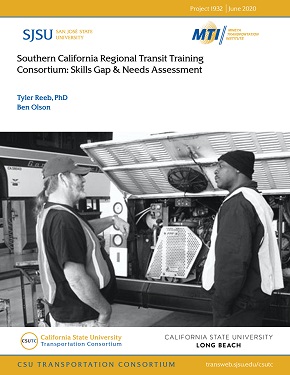- 408-924-7560
- mineta-institute@sjsu.edu
- Donate
Southern California Regional Transit Training Consortium: Skills Gap & Needs Assessment
The transit sector grows and evolves quickly with the needs of growing, busy cities. With this growth comes a need for more transit workers and more training to ensure workers can best serve their diverse communities. This report contains a transit training needs assessment and gap analysis to identify the most pressing challenges of the evolving transit workforce served by the Southern California Regional Transit Training Consortium (SCRTTC). Most importantly, this report documents and determines SCRTTC priorities to ensure the incumbent and future transit workforce is equipped with the professional and technological skills required to address the transformational trends affecting the transit sector. The report primarily utilized qualitative methods with the use of a series of interviews, a focus group, a workshop, and an online survey. Above all, this assessment discovered that existing SCRTTC training curriculum is respected, and there is strong demand for additional topics. Transit maintenance professionals consistently endorsed the value and quality of SCRTTC training—they just want more of it. They want it to be developed more efficiently and at a higher volume. They seek more localized and customized delivery methods for training and curriculum. All of those findings compel a question: How can SCRTTC make organizational changes to more rapidly develop curriculum and provide targeted training programs for technicians? This report recommends SCRTTC integrate a suite of digital products into the SCRTTC website to respond to the needs documented in this assessment—namely higher capacity for more training offerings and more online delivery methods while simultaneously enhancing member demands for more customized and location-based training. Implementing the digital platform recommended in this report would empower SCRTTC leadership to foster increased interactivity between transit agencies, training partners, and SCRTTC management. These digital tools would enable SCRTTC to expand its coverage to all of California. This statewide approach to transit training could be used to implement similar consortia in states throughout the U.S.
TYLER REEB, PhD
Dr. Tyler Reeb is the Director of Research and Workforce Development for CITT and the Associate Director of the Federal Highway Administration’s Southwest Transportation Workforce Center housed at CITT. He also serves as the editor of METRANS NEWS, a tri- quarterly publication that summarizes METRANS research, education, and outreach efforts. Dr. Reeb is the editor and principal author of Empowering the New Mobility Workforce: Educating, Training, and Inspiring Future Transportation Professionals (Elsevier, 2019). Dr. Reeb leads teams of researchers who address challenges and opportunities related to the new mobility workforce, transformational technology, institutional change, organizational management, and transportation systems management operations (TSM&O). He draws from industry benchmarking, labor market analysis, future scenario planning, systems thinking, enterprise resource planning, and GIS tools to produce research-driven reports, articles/whitepapers, books, and multimedia products that promote innovation and civic partnerships between leaders in business, government, and education. Dr. Reeb was the lead author for a successful $1.5 million FHWA grant application to fund deployment of the National Transportation Career Pathway Initiative. He is a member of two standing committees of the National Academies of Sciences, Engineering, and Medicinefocused on Transportation Education & Training and Native American Transportation Issues. Dr. Reeb has a Bachelor’s in English Literature and Mass Media and a PhD in English with an emphasis in Transdisciplinary Research Methods.
BEN OLSON
Ben Olson is the Research and GIS Coordinator at the Center for International Trade and Transportation (CITT) at California State University, Long Beach (CSULB). At CITT, Ben manages the center’s GIS projects and research responsibilities. He has contributed to the development of GIS applications and their integration into training programs for working professionals and K-12 audiences. Some topics include passenger-freight conflicts in the Los Angeles region, freight movement in the Inland Empire, the agricultural supply in the Central Valley, and the regional supply chain of Southern California. His published research topics include a needs assessment for the Southern California Regional Transit Training Consortium, developing and testing a digital walk audit to improve community planning, and visualizing disparity in the transportation workforce. He and his partner were finalists in the Southern California Association of Governments (SCAG) 2018 annual Student Showcase Story Map Challenge for their story map narrating the hypothetical transportation planner career pathway and related education and training of a high school student interested in GIS. Ben received his Master’s in Geographic Information Science from CSULB and Bachelor’s in Statistics and Spanish from the University of Illinois, Urbana-Champaign (UIUC). As a student, Ben worked at the GIS Department at the City of Irvine and at Caterpillar Inc’s Data Innovation Lab at UIUC.
-
Contact Us
San José State University One Washington Square, San Jose, CA 95192 Phone: 408-924-7560 Email: mineta-institute@sjsu.edu






